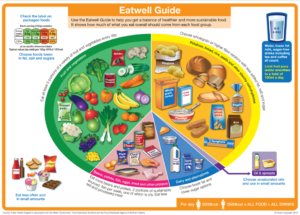Eating disorders
What are eating disorders?
We know that as parents and carers, this topic, much like many topics, can be worrying. We want to provide you with information that will inform you but also point you in the direction of resources and if you need it, services that can help you further.
Eating disorders are serious mental illnesses that involve disordered eating behaviour to cope with difficult situations or feelings. Eating disorders can affect people of all ages, gender, ethnicities and backgrounds. Behaviours can include limiting the amount of food eaten, eating very large amounts of food at once, getting rid of food eaten through unhealthy means (for example, purging, such as self-induced vomiting and/or laxative misuse, fasting or excessive exercise) or a combination of these behaviours.
It is important to remember that eating disorders are not all about food itself but about feelings. The way the person interacts with food may make them feel more able to cope or make them feel in control.
The different types of eating disorders are:
| Anorexia Nervosa
Usually involves seriously restricting food intake and sometimes can include binge/purge cycles or too much exercise. Other possible signs include weight loss, a fear of putting on weight, wearing baggy clothes, obsessively counting calories and difficulty focusing. |
| Bulimia Nervosa
Cycles of bingeing (eating lots of food at once) and then purging (compensating for food eaten, for example by fasting, exercising excessively, making themselves sick or taking laxatives. Other possible signs include fluctuations in weight, disappearing after meals, tooth decay, bad breath and feeling out of control around food. |
| Binge Eating Disorder
Eating lots of food in one go but not compensating for this. Often binges are in secret and pre-planned. Other possible signs include eating faster than usual, feeling out of control around food, weight gain and eating when not hungry. |
| Other Specified Feeding or Eating Disorder (OSFED)
If symptoms do not fit the diagnostic criteria for the above eating disorders, they could be diagnosed with OSFED. Signs may include the ones listed above. |
| Avoidance/Restrictive Food Intake Disorder (ARFID)
This is when someone only eats an extremely narrow variety of foods. This avoidance may be based on appearance, smell, taste, texture (because of sensory sensitivities), brand, presentation, fear of adverse consequences, lack of interest in food or a past negative experience with food. Unlike other eating disorders, the fixation is not caused by a concern for body appearance or to lose weight. |
Some general signs in adolescents that could be associated with an eating disorder include:
- Being preoccupied with food.
- Skipping meals and being obsessive about calories.
- Showing secretive behaviour around food.
- Eating overly large portions at mealtimes, constant snacking, hoarding food.
- Eating only low-calorie food, cutting out certain food types.
- Disappearing to the toilet after meals.
- Self-conscious when eating in front of other people.
- Showing a keen interest in buying or cooking food for others.
- Feeling anxious, guilty and ashamed.
- Tiredness.
- Wearing baggy clothes.
- Being irritable and having mood swings.
- Social withdrawal.
- Low self-esteem.
What is healthy eating for my adolescent child?
A nutritionally balanced diet is necessary throughout life and is provided by regularly eating a variety of foods. Healthy food habits established in childhood and adolescence will provide the foundations to positive beliefs, attitudes and behaviours to food and eating in later life. Poor eating habits established early in life will be hard to change and can have a harmful effect on immediate and long-term physical and mental wellbeing.
The Eatwell Guide indicates the proportions of different foods that make up a healthy diet (Food Agency Standard). In addition to physical needs, food meets emotional, sensory and social needs. Food satisfies hunger. It is a source of pleasure. Families often meet at mealtimes for relaxation and use food to celebrate special occasions.

Parent and carers top tips to support your adolescent child
- Take time to talk to your adolescent child: Some young people may find it difficult to accept that they may have a problem with their eating or need support. If they find it difficult to talk to you, encourage them to talk to another trusted adult or family member.
- Make time to listen to them: Create a calm, safe space where they can communicate how they feel without being judged. Avoid saying things that could feel accusatory, critical or dismissive.
- Try to understand the problem and provide reassurance that you hear them and are there to help: Ask how they are feeling rather than focussing all the conversation on their eating or weight. Compliment them on things other than their appearance.
- Encourage regular mealtimes as a family: Sitting down together for regular mealtimes as a family can help encourage social and healthy eating behaviours and help monitor any concerns about eating. Try to keep the conversation neutral.
- Keep an eye on the child/adolescent. Consider if the eating problems persist, deteriorate and/or are impacting on their day to day living: Seek specialist advice (see below). Increase vigilance by checking if they are losing weight, developing secondary physical health symptoms or accessing websites/social media content that promotes eating disorders.
- Support your child/adolescent to participate in positive activities that helps prevent them from becoming isolated: Positive activities include safe contact with family and friends. This can provide distraction from negative and intrusive thoughts and may help the young person open up about their feelings.
- Provide structure and routine (including sleep pattern): Frequent changes to routine and restrictions can cause some children/adolescents to feel upset and anxious. Providing structure through the development of daily/weekly timetables, that includes bedtime routines, can benefit young people with predictability and can help distract from negative behaviours/thinking.
- Finally, as a parent or carer looking after your own mental and physical health too: This will help you to best support yourself and those you care about.
Where can I get more advice from National resources and support?
| Link and /or QR code | Description |
| Online support groups – Beat | Beat is the UK’s Eating Disorder Charity. Beat run a number of eating disorder online support groups. |
| The New Maudsley Approach – A resource for professionals and carers of people with eating disorders | The New Maudsley Approach website provides a toolkit to help educate, empower and equip parents and carers to deal more effectively with the stressful caring role. |
| Maudsley Parents – family-based treatment for eating disorders, anorexia nervosa, and bulimia nervosa | Maudsley Parents is a website for parents of eating disordered children and provides information on the Maudsley Family Based Treatment Approach. |
| FEAST: Support and resources for families affected by eating disorders | F.E.A.S.T. is an international organisation for parents and caregivers to help loved ones recover from eating disorders. |
| F.E.A.S.T’s Around The Dinner Table forum | Around the Dinner Table forum is a free service provided for parents of those suffering from eating disorders. It is moderated by kind, experienced, parent caregivers trained to guide you in how to use the forum and how to find resources to help you support your family member. |
| Anorexia and other eating disorders: how to help your child eat well and be well. Book, videos, coaching/counselling | This website is linked to Eva Musby’s book: Anorexia and Other Eating Disorders: how to help your child eat well and be well. Provides practical solutions, compassionate communication tools and emotional support for parents of children and teenagers. |
| TalkED | Formerly Anorexia and Bulimia Care, TalkED offers support and practical guidance for anyone affected by eating disorders, those struggling personally and parents, families, and friends. They have an online community for carers and a live chat session one evening a week. |
| The Dangers of Pro-Ana and Pro-Mia – Beat | A brief article from Beat about the dangers of pro-anorexia and pro-bulimia content. |
Where can I get local advice and support?
If you are concerned that your child/young person may have an eating disorder and you’d like help or advice, please contact the Child and Adolescent Mental Health Services (CAMHS) Specialist Eating Disorder Team in your area:
Hampshire
Hampshire Eating Disorder Service
Telephone: 0300 304 0062
Email: SPNT.HantsCamhsEDT@nhs.net
Also see the Hampshire CAMHS parents and carers guide on Eating Difficulties.
Isle of Wight
Isle of Wight Eating Disorder Team
Telephone: 01983 523602
Email: iownt.spcamhs@nhs.net
Also see the CCAMHS information on Types of Eating Disorder.

